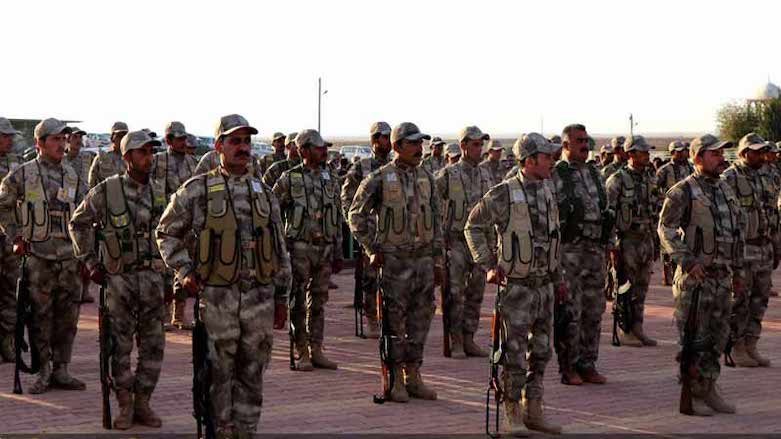Syrian Kurds pause conscription for people displaced from Turkey-held areas

ERBIL (Kurdistan 24) – The Autonomous Administration of North and East Syria this week suspended military conscription for military-aged men from areas occupied by Turkey in the northeast amid worsening economic conditions.
There is a growing frustration over worsening economic conditions and forced military service in northeastern Syria.
Last week authorities in Manbij decided to halt military conscription (known locally as the duty for self-defense) in the town after violent protests.
Since November 2014, the Kurdish-led authorities in northeast Syria have enforced military conscription for military-aged men of all ethnicities, a decision unpopular among local Kurds and Arabs alike.
Thousands of people fled Afrin after the Turkey-backed Syrian National Army groups took control of the area in March 2018, while another wave of civilians were displaced from Tal Abyad and Serekaniye (Ras al-Ain in Arabic) after Turkey’s incursion in October 2019. Many of them are now living in cities or camps in areas controlled by the AANES.
“The decision of military conscription has been made wrongly since the beginning where many people who have served within Syrian military, who are knowledgeable about how to utilise weapons and self-defense, but who were also obliged to reserve,” Azad Nebi, a UK-based Syrian Kurdish student, told Kurdistan 24.
“Additionally, there is a sort of discriminatory application of conscription rules across AANES. For example, young people in Manbij have recently been exempt from conscription while people who remain in Kurdish predominantly-held areas are still subject to old rules.”
“This is unfair and discriminatory,” he said. “I also believe the decision made to temporarily exempt people originally from Turkish-occupied areas will have a positive impact on those citizens. But yet it must be inclusive across all territories held by AANES.”
Mohammad Ibrahim, a local researcher focused on northeast Syria, told Kurdistan 24 that Afrin, Serekaniye and Tal Abyad “are occupied and their youth are displaced, not ready for conscription while their homes are occupied.”
“There were a lot of local demands to abolish this rule,” he added. “The majority of local northeast Syria youth are unwilling to be forcefully conscripted.”
Ibrahim said that Manbij has the lowest rate of conscription compared to the other areas under control of the Syrian Democratic Forces, yet frustrations have escalated the most there.
The Syrian government and Turkey both seek to use local resentment to undermine the SDF and civilian AANES, he claimed.
“Both do have the ability to undermine stability and security in these areas to challenge the US presence, by delegitimizing their key local partner,” Ibrahim said.
“Some might see it further linked to the upcoming Erdogan-Putin, Putin-Biden meetings, in which the northeast Syria file might be on agenda, at least for Manbij,” where he said Russia, Turkey, and the US have had “divergent and separate plans for” for some time.
Nicholas Heras, a Senior Analyst at the Newlines Institute in Washington, DC, told Kurdistan 24 that the Autonomous Administration is in a bind.
“It needs to show that it is flexible enough to deal with the realities that are developing on the ground, especially in Turkish-controlled areas,” he added. “This is also an acknowledgement that the Turkish-occupied areas of northeast Syria are not going back to the Autonomous Administration in the foreseeable future."